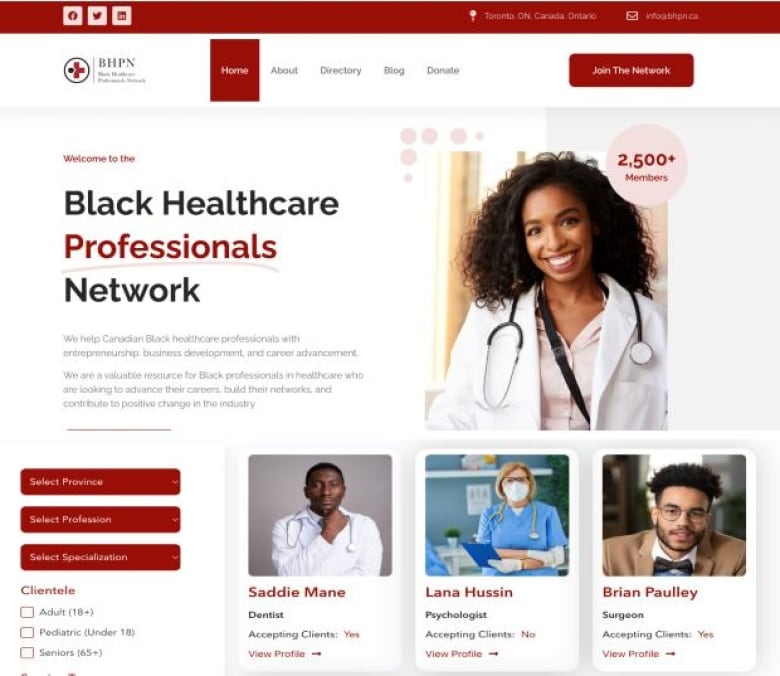
A new directory of Black health-care professionals across Canada launched Thursday, and creators of the database say its goal is to help improve access to practitioners for Black Canadians who often struggle to find providers who understand their backgrounds.
The directory was created by the Black Healthcare Professionals Network, an organization founded in 2021 to advance the careers of Black professionals working in health care and engage in advocacy.
Dr. Nikolai Whyte, the network’s co-founder and managing director, says the organization wanted to launch the directory not only too increase access to providers, but to build a network between professionals.
“It helps to create an ecosystem within the Black health-care space where other providers can find each other and start to collaborate,” said Whyte, who works as a family doctor.
Health-care providers voluntarily sign up for the directory and are vetted to ensure their licences are in good standing, the network says. The goal is for the directory to include doctors, nurses, pharmacists, dentists, psychotherapists, dietitians, massage therapists and other practitioners.
The contact information of each provider is on the website, and patients can contact them directly, a news release for the directory says.
Whyte says the directory is especially important in light of research showing that for Black people, health-care outcomes can be dependent on the race of both the provider and the patient. The network points to research published by the Association of American Medical Colleges that indicates Black patient experiences improved with doctors of the same race. Pairing Black patients with doctors who are also Black helps to combat medical racism that has sometimes occurred when Black people are treated by white providers, according to the research.
One study in particular, led by researchers at the Stanford University School of Medicine, found that in a survey of 1,300 Black men in California, patients assigned to a Black doctor were more likely to bring up specific health concerns that they were not speaking about with other doctors.
Researchers suggested the patients may have been more comfortable opening up to Black physicians as they were made to feel more “at ease.”
In Toronto, one community health centre focused on Black residents in Scarborough found similar benefits starting in 2013. A pilot project at the TAIBU Centre aimed to increase cancer screenings through culturally sensitive materials featuring diverse staff, pamphlets in multiple languages and providers who were Black. The centre said it was able to boost its screenings from 2013 to 2018 due to the program, doctors said in a 2021 paper on their findings.
Doctors who led the study told CBC News in 2021 that they hoped their methods could be used as a blueprint to increase screenings in diverse communities, who tend to be underscreened for cancer.
Creating trust between patients and providers
Paul Bailey, the executive director of the Black Health Alliance, a Toronto-based charity that aims to improve the health of Black communities, said patients sometimes struggle to find clinicians that understand their needs.
“We often get several reach outs a week, just to our general inbox, looking for Black physicians, and that’s coming from folks who are across the country,” said Bailey, who is not connected to the registry.
He said the directory is a “good opportunity to try and provide a space where clients, patients and other providers can find clinicians.”
“What we understand is that, if folks are finding the kinds of clinicians or health-care providers that understand their needs, that they’re more likely to follow up and follow through on those interventions that are being provided,” he said.

Adding to that, many in racialized communities have a distrust of the health-care system, and may avoid care because of it, said Whyte. In 2022, the Canadian Medical Association journal acknowledged anti-Black racism in Canadian health care is an issue and noted racial stereotypes have led to poor delivery of care, fuelling distrust in the system.
The journal acknowledged its engaged in harmful practices, including a lack of Black experts being represented in the journal.
Having a provider who understands an individual’s cultural background can increase trust, said Whyte.
Tool ‘can be used by everyone’
Abena Addo, who also co-founded the network and co-created the directory, said she hopes all Canadians find the database useful — as it’s tough to find a provider, regardless of their race.
“There’s a shortage of family doctors, so this is a way the tool can be used by everyone,” she said.
It also highlights what Black health-care providers have to offer, she said.
“We’re actually elevating these healthcare professionals who are sometimes not at the forefront,” she said. “This directory is a great way to have them showcase their business.”
For more stories about the experiences of Black Canadians — from anti-Black racism to success stories within the Black community — check out Being Black in Canada, a CBC project Black Canadians can be proud of. You can read more stories here.
